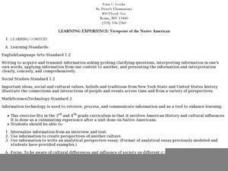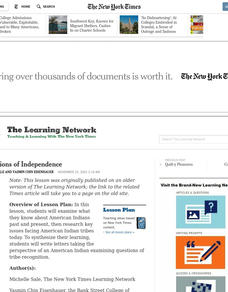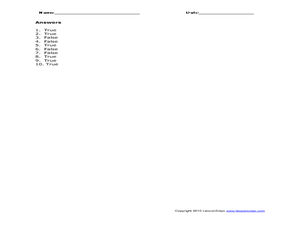Curated OER
1704 Attack on Deerfield
Class groups examine conflicting primary and secondary sources describing the 1704 attack on the fort at Deerfield by French and Native Americans and analyze the implications of discrepancies.
Curated OER
Viewpoint of the Native American
Students compare how Native Americans were treated long ago to how they are treated today. They write an essay from the perspective of a Native American from their time period explaining their side with details supporting their views.
Curated OER
"Some Excellent Dumb Discourse:" Caliban as native American
Explore The Tempest and how language and power are intertwined in the play. Through a series of questions (provided) and an intense activity that has groups translate Caliban's speech into American Sign Language, learners recognize...
Pace University
The Iroquois
During the early 1500s, parts of modern-day New York were inhabited by Eastern Woodland Native Americans. To learn about the daily life, value, and traditions of these tribes, fourth graders research the Iroquois. Groups select projects...
Curated OER
Declarations of Independence
Learners examine what they know about American Indians past and present, then research key issues facing American Indian tribes today. To synthesize their learning, students write letters taking the perspective of an American Indian.
Curated OER
Survival of Native American Culture
Students research the five tribes of the Iroquois Nation focusing on housing, food, clothing, transportation, religion, and language. They research using Internet sources and book mark sites for reuse.
Curated OER
The Finish Line
Students investigate the philanthropy of various cultural traditions. In this cultural education lesson, students read a handout about Native American, European American, and African American traditions and identify the philanthropic...
Curated OER
Pooling Common Knowledge
Fifth graders examine Native American cultures. In this diversity lesson, 5th graders prepare oral reports based on the research they conduct regarding Native American clothing, holidays, and sports.
Curated OER
Westward Expansion: Chief Joseph's Words Of Surrender
Students explore westward expansion in the United States as it relates to Native Americans and the novel Holes. Students read a passage from Holes and discuss how westward expansion affected the Native Americans. Students compare and...
Curated OER
Global Diversity Through Literature
Students investigate Southwest Indian Reservations. In this Native American lesson, students research Southwest Indian tribes on the Internet and by reading the book, Arrow to the Sun.
Curated OER
Breathing New Life into Old Traditions
Learners investigate the role of ceremonies and other traditions of Native American cultures. They research various Native American nations and create posters that visually depict their research.
Curated OER
Searching the Net
Students create a Native American Nation flip book. In this Native American lesson, students choose one of four Native American Nations: The Iroquois, Hopi, Seminoles, Sioux. They research them on the Internet using teacher given...
Curated OER
American Indians
In this American Indians worksheet, students read a 2 page article on American Indians, answer 6 statements as true or false and fill in 8 blanks in 8 facts referring back to American Indians.
New York City Department of Education
Geography and Early Peoples of the Western Hemisphere
Young historians discover the early people of the western hemisphere. The unit explores how the land changed, how it was used and homes of early Americans such as Incas, Mayans, Inuits, Aztecs, and Pueblos. Individuals also examine these...
City University of New York
African Americans and the Populist Movement
Why did the Populist Party fail to ally itself with African American farmers? To answer this essential question, class members investigate the Populist Era (188-1900) and read an article written by Tom Watson, a Populist leader.
Curated OER
Early Native Americans
Fourth graders locate on a globe where the land bridge was. They describe the progression of nomadic people into North America.
Curated OER
New Jersey
In this reading comprehension worksheet, students read a passage about the early history of the state of New Jersey and answer true and false questions. Students write 10 answers.
Curated OER
Intermediate Level Lesson Plan THEMATIC ESSAY
Students identify three reasons why conflict arose in the Western United States during the late 1800s. Using specific examples, discuss how the United States government attempted to resolve these conflicts. Evaluate whether these...
Curated OER
"Some excellent dumb discourse:" Caliban as native American
Twelfth graders explore some of the colonial implications of The Tempest, analyzing how language and power interrelate in the play and using another American voice, American Sign Language, to consider the different forms of communication...
Curated OER
Native Species Restoration and its Impact on Local Populations
Learners explore how predators help control the growth of prey species for a more balanced ecosystem.
Curated OER
Ghost Canoe
Fourth graders are read the book "Ghost Canoe" by their teacher. Using a map, they locate the physical characteristics of Washington State and describe how people adapted to their environment before statehood. They discover how people...
Curated OER
WINTER-STORYTELLING
The student evaluate illustrations in a book, identify a story or book as distinctly Native American, draw original illustrations for a story, create a flip book, listen attentively to stories from a known storyteller, act out a story,...
Curated OER
Virtual Scavenger Hunt
Students use their books and the Internet to explore and find specific information about the Native Americans that were in Florida during the 1500's.
Achieve The Core
Linda R. Monk, Words We Live By: Your Annotated Guide to the Constitution - Grade 8
“We the people . . .” Thus begins the Preamble to the Constitution. Using a close reading approach, class members examine an excerpt from Linda Monk’s article that traces how the interpretation of these words has evolved. Some of your...

























